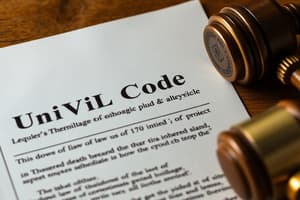Podcast
Questions and Answers
What was the outcome of the Shah Bano case in 1985?
What was the outcome of the Shah Bano case in 1985?
- The Supreme Court ruled in her favor, recommending the establishment of a uniform civil code. (correct)
- The Supreme Court ruled that her maintenance claim was invalid due to lack of evidence.
- The Supreme Court ruled in favor of her husband, upholding his obligations under Islamic law.
- The Supreme Court dismissed the case, stating it fell under personal law and not applicable to secular laws.
What was the main significance of the Daniel Latifi case related to the Muslim Women's Act (MWA)?
What was the main significance of the Daniel Latifi case related to the Muslim Women's Act (MWA)?
- It challenged the constitutionality of MWA under Articles 14, 15, and 21. (correct)
- It recommended extending MWA to all women regardless of religion.
- It upheld the complete validity of MWA without any modifications.
- It advocated for stricter enforcement of MWA across all states in India.
In what year did the amendment to the Hindu Succession Act grant daughters inheritance rights in ancestral property?
In what year did the amendment to the Hindu Succession Act grant daughters inheritance rights in ancestral property?
- 1965
- 1956
- 1985
- 2005 (correct)
What led to the passing of The Muslim Women’s (Right to protection on divorce) Act (MWA) in 1986?
What led to the passing of The Muslim Women’s (Right to protection on divorce) Act (MWA) in 1986?
What was the main aim of the Hindu Code Bill drafted by Dr. B R Ambedkar?
What was the main aim of the Hindu Code Bill drafted by Dr. B R Ambedkar?
What is the main focus of Article 44 of the Indian Constitution?
What is the main focus of Article 44 of the Indian Constitution?
In what areas does a Uniform Civil Code aim to provide equal treatment according to the text?
In what areas does a Uniform Civil Code aim to provide equal treatment according to the text?
Which principle does a Uniform Civil Code in India challenge based on the given text?
Which principle does a Uniform Civil Code in India challenge based on the given text?
What was the first significant action related to a Uniform Civil Code in India mentioned in the text?
What was the first significant action related to a Uniform Civil Code in India mentioned in the text?
What is the rationale behind implementing a Uniform Civil Code according to the provided text?
What is the rationale behind implementing a Uniform Civil Code according to the provided text?
Study Notes
Uniform Civil Code in India
- The concept of Uniform Civil Code (UCC) is enshrined in Article 44 of the Indian Constitution, which aims to provide a uniform civil code throughout the territory of India.
- UCC is based on the premise that there is no connection between religion and law in modern civilization.
Historical Perspective
- The debate for a UCC dates back to the colonial period in India, when criminal laws were codified and became common for the whole country, but personal laws continued to be governed by separate codes for different communities.
- The Hindu Code Bill, drafted by Dr. B.R. Ambedkar, aimed to reform Hindu laws, legalizing divorce, opposing polygamy, and giving rights of inheritance to daughters.
Key Reforms and Acts
- The Hindu Succession Act, 1956, originally did not give daughters inheritance rights in ancestral property, but this disparity was removed by an amendment to the Act on September 9, 2005.
- The Hindu Marriage Act, Minority and Guardianship Act, Adoptions and Maintenance Act, and Special Marriage Act were also introduced.
Shah Bano Case (1985)
- Shah Bano, a 73-year-old woman, was divorced by her husband using triple talaq and was denied maintenance.
- The Supreme Court ruled in her favor in 1985, recommending that a uniform civil code be set up.
- The ruling led to nationwide discussions, meetings, and agitations, and the then government passed the Muslim Women's (Right to Protection on Divorce) Act (MWA) in 1986.
Daniel Latifi Case
- The Muslim Women's Act (MWA) was challenged on the grounds that it violated the right to equality and the right to life under the Constitution.
- The Supreme Court held that the amount received by a wife during iddat period should be large enough to maintain her during iddat as well as provide for her future.
Challenges and Suggestions
- UCC resonates with the concept of "one country, one rule" to be applied to all religious communities.
- The implementation of UCC faces challenges, including the need for a harmonious blend of different personal laws and the need to address the question of gender justice and equality.
Studying That Suits You
Use AI to generate personalized quizzes and flashcards to suit your learning preferences.
Description
Explore the challenges, suggestions, and debate surrounding the Uniform Civil Code (UCC) in India. Learn about the concept of 'one country, one rule' and its implications for all religious communities. Dive into the constitutional aspect of UCC as mentioned in Article 44 of the Indian Constitution.
![Uniform Civil Code - Challenges, Suggestions & Debate [UPSC Notes]](https://images.unsplash.com/photo-1515879218367-8466d910aaa4?crop=entropy&cs=srgb&fm=jpg&ixid=M3w0MjA4MDF8MHwxfHNlYXJjaHwyfHxVbmlmb3JtJTIwQ2l2aWwlMjBDb2RlJTJDJTIwVVBTQyUyME5vdGVzJTJDJTIwSW5kaWFuJTIwQ29uc3RpdHV0aW9uJTJDJTIwZGViYXRlfGVufDF8MHx8fDE3MTE1NzA2MDh8MA&ixlib=rb-4.0.3&q=85&w=800&fit=crop&h=300&q=75&fm=webp)


